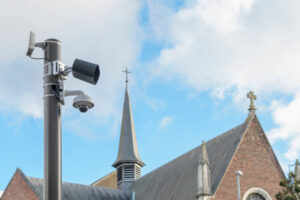Church Security: Protecting Sacred Spaces in a Changing World
For centuries, churches have served as sanctuaries—places of peace, worship, and community gathering. They are sacred spaces where people seek refuge from the world’s challenges, expecting comfort, safety, and spiritual nourishment. However, in recent years, tragic events across the United States and around the globe have shown that even places of worship are not immune to danger. Churches have increasingly become soft targets for violence, theft, and other security threats.
The importance of church security has never been more pressing. Protecting congregants, clergy, staff, and property is no longer just a precaution—it is a necessity. This blog will explore why church security matters, the potential threats churches face, and how professional security solutions can safeguard sacred spaces while maintaining the welcoming atmosphere that makes them so important to communities.
The Rising Need for Church Security
Churches were once thought of as immune to violence. Unfortunately, modern threats have changed that perception. Incidents of active shooters, vandalism, theft, and even terrorism directed at places of worship have made headlines far too often. According to the Department of Homeland Security, faith-based organizations remain among the most vulnerable public gathering places because of their openness and accessibility.
Churches often host large numbers of people in confined spaces, making them attractive targets for those seeking to cause harm. Additionally, because churches operate on trust and hospitality, security measures are often minimal or nonexistent. This combination of openness and vulnerability underscores the critical importance of having a security plan in place.
Common Security Threats Facing Churches
-
Active Shooter Incidents
One of the most serious and devastating threats to churches is the possibility of an active shooter attack. In past tragedies, churches have experienced loss of life and deep emotional trauma. These events highlight the urgent need for churches to develop active threat response plans and implement visible deterrents such as trained security personnel. -
Theft and Burglary
Churches often hold valuable items—donations, sound equipment, musical instruments, and sometimes historical artifacts. Empty sanctuaries can become targets for break-ins, especially in urban areas. -
Vandalism and Hate Crimes
Houses of worship have increasingly become targets of vandalism, graffiti, and even arson. In some cases, attacks are motivated by hate crimes or bias against certain religious groups. -
Disruptions During Services
Protests, disturbances, or disruptive individuals can interrupt services and create chaos. Without trained personnel, church leaders may struggle to de-escalate these situations. -
Domestic Situations
In some cases, disputes spill into the church environment, such as custody disagreements or interpersonal conflicts. Churches must be prepared to handle these sensitive issues with both compassion and professionalism.
The Importance of a Security Presence
Security in churches is not about instilling fear—it’s about creating an environment of safety where worshippers can focus on their faith without distraction. A well-structured church security program provides several key benefits:
-
Peace of Mind for Congregants: Attendees feel safer knowing measures are in place to protect them.
-
Crime Deterrence: A visible security presence reduces the likelihood of vandalism, theft, or violence.
-
Quick Emergency Response: Trained personnel can act immediately during crises, reducing potential harm.
-
Community Trust: Families are more likely to participate in services and events when they know safety is prioritized.
-
Protection of Property and Resources: Security helps safeguard the church’s financial assets, buildings, and valuable equipment.
Balancing Security and Hospitality

One of the challenges for churches is balancing the need for safety with the desire to remain welcoming and open. Congregations thrive when people feel invited and comfortable, so church leaders often fear that implementing security measures may make the environment feel unwelcoming.
However, security done right can be nearly invisible while still highly effective. Trained security professionals understand how to blend into the environment, offering protection without disrupting the sacred and peaceful nature of worship. Many security guards are trained not only in safety and response protocols but also in customer service, allowing them to greet congregants warmly while maintaining vigilance.
Building a Comprehensive Church Security Plan
Every church, regardless of size or denomination, can benefit from a customized security strategy. A strong plan typically includes the following elements:
-
Risk Assessment
A professional security team can evaluate the church’s vulnerabilities—such as poorly lit areas, multiple entrances, or inadequate surveillance. -
Emergency Preparedness
Churches should establish clear protocols for emergencies, including active shooter response, medical incidents, fire, or severe weather. -
Trained Security Personnel
Whether armed or unarmed, trained security guards serve as a first line of defense. They can monitor entrances, patrol parking lots, and respond to emergencies immediately. -
Technology and Surveillance
Modern churches benefit greatly from surveillance cameras, access control systems, alarm systems, and even mobile panic buttons that allow for instant communication with local law enforcement. -
Volunteer Security Teams
In some congregations, volunteers work alongside professional guards to keep watch during services. These volunteers should always receive proper training and background checks to ensure reliability and safety. -
Communication Plans
During emergencies, clear communication is critical. Churches should establish notification systems to alert congregants of dangers and guide them to safety. -
Partnerships with Local Law Enforcement
Many churches build relationships with local police departments. Officers can provide training, advice, and faster response times when incidents occur.
Training and Education
An often-overlooked part of church security is training not just for guards but also for staff and volunteers. Ushers, greeters, and clergy should all be trained in basic security awareness. This includes:
-
Recognizing suspicious behavior.
-
Knowing how to calmly de-escalate confrontations.
-
Understanding evacuation procedures.
-
Providing first aid or CPR if necessary.
Regular drills can make these protocols second nature, ensuring everyone knows what to do when seconds count.
The Role of Technology in Modern Church Security
Technology has become an indispensable tool in church security strategies. Some of the most effective solutions include:
-
CCTV Cameras for monitoring entrances, hallways, and parking lots.
-
Access Control Systems to limit who can enter certain areas.
-
Alarm Systems to alert leaders and law enforcement of intrusions.
-
Mobile Safety Apps for instant alerts to staff and congregants during emergencies.
When combined with human oversight, these tools create a layered approach that strengthens overall safety.
How Security Enhances, Not Diminishes, Faith
Some congregations worry that increasing security measures may distract from the spiritual mission of the church. In reality, security supports the mission by ensuring that worshippers can gather in peace and safety. Protecting the flock is part of the church’s responsibility, echoing biblical teachings about shepherds guarding their sheep.
Church security is not a lack of faith—it is an expression of stewardship and responsibility. Taking steps to protect the congregation shows care, love, and foresight.
Why Professional Security Companies Are Essential
While volunteers play an important role, nothing replaces the expertise of a professional security company. Trained security officers:
-
Have experience in threat assessment and crisis management.
-
Are licensed, insured, and regulated by state authorities.
-
Undergo continuous training in both safety and hospitality.
-
Provide a consistent presence that reassures congregants and deters criminals.
By working with a security company, churches gain peace of mind knowing that experts are safeguarding their people and property.
Conclusion
Churches are more than buildings—they are the heartbeat of communities, offering spiritual support, fellowship, and guidance. Yet as recent events across the country have shown, they are not immune to threats. The importance of church security cannot be overstated.
By combining professional security services, trained volunteers, modern technology, and strong emergency protocols, churches can maintain their openness and warmth while ensuring the safety of all who enter. A secure church is a thriving church—one where worshippers can focus on faith, free from fear.
As the world continues to change, one thing remains constant: the need to protect our sacred spaces. Investing in church security is not just about prevention; it’s about preserving the sanctuary that churches represent for future generations.
LINKS:
https://www.yelp.com/biz/hub-security-and-investigative-group-boston

